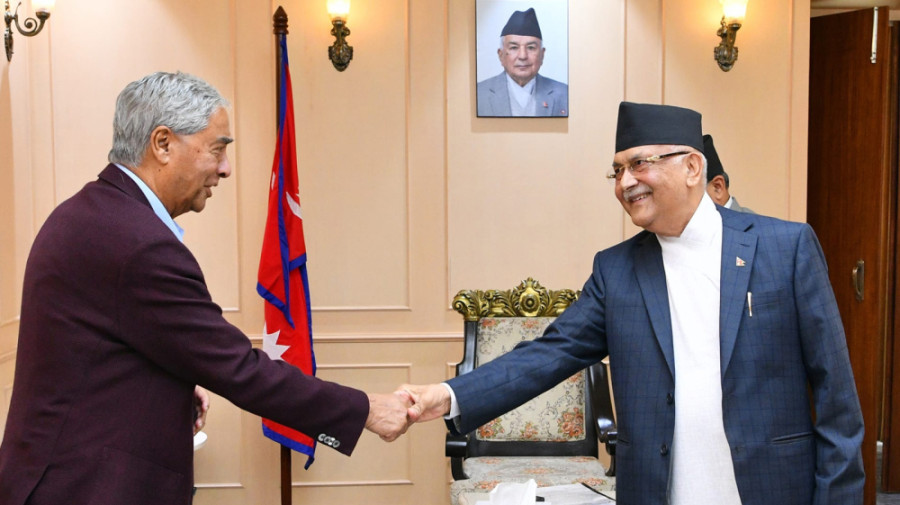Columns
Consti-tuition, a lesson parties need
Pressing priority should be constitutional conscience, not the pursuit of power.
Sanjeev Satgainya
Earlier this week, Prime Minister and CPN-UML Chair KP Sharma Oli completed five months in office. His tango with Nepali Congress President Sher Bahadur Deuba seems to be proceeding well. Over the last few months, the top leaders of Nepal’s two major political parties have been excessively focused on not offending each other, as doing so could tip the balance.
Since this new coalition was formed without a clear vision, it failed to inspire confidence from the outset. Hence, on the delivery front, the Oli administration was bound to fail.
The CPN-UML and the Nepali Congress decided to join forces with the promise of amending the constitution to ensure political stability. Over the past months, the two parties have offered numerous reasons for forming the coalition, but none involve the constitutional amendment issue, as if it has vanished from their agenda.
Neither party has provided answers about the amendment process, likely because they don’t have one.
While an amendment to the constitution is not inherently problematic, there must be a clear rationale. The justification the two parties offered was so flimsy that it was evident from the start that their amendment rhetoric was just a ruse. Even if they are committed to their promise, it remains a misguided priority. The need of the hour is addressing more urgent matters, such as good governance and service delivery, which are directly linked to citizens.
Misplaced priority
Nepal’s major political parties—the NC, the UML and the CPN (Maoist Centre)—seem to have little confidence in the constitution they once championed through majoritarian dominance. Dissenting voices were ignored, suppressed and silenced.
They once called it the world’s best but are now finding fault with it—not because it has caused problems for the people but because it obstructs their pursuit of majority governments. At least, this has been the argument of the UML and the Congress of late because they are the largest parties and are aiming for a majority in the next elections.
Nevertheless, once promulgated, it was incumbent upon Nepali parties to focus on full implementation of the constitution. This required following due processes—enacting laws, devolving power and strengthening institutions. However, none of the parties paid attention to these fundamentals. Instead, they treated the constitution as a tool to “rule” when the charter required them to “govern.”
Post-2015, Nepali parties had only two key responsibilities—governance and constitution implementation. They failed on both fronts, especially because they were excessively involved in the game of one-upmanship. These key duties were thus relegated to the back burner.
Spirit of the constitution
A pluralist, inclusive, progressive and peaceful society was the core idea of the constitution. But this very spirit is under threat from the parties that are supposed to safeguard it, as they have failed to internalise the concept of constitutionalism in its true sense.
Nepali politicians often cite the holding of two sets of national, provincial and local elections within the prescribed timeframe and the formation of governments to argue that democracy is functioning in Nepal. While this reasoning has merit, democracy’s full functionality depends on its realisation at the grassroots and among the people.
True upholding of constitutionalism means abiding by its principles, respecting its limitations and adhering to the rule of law. Only then can the pluralistic, inclusive and progressive society envisioned by the constitution be built.
Stable and accountable governance entails adherence to the rule of law, the protection of individual rights and the separation of powers.
But questions remain: Have successive governments, regardless of which parties or leaders led them, fully complied with the laws? Has the system of checks and balances been allowed to operate fully in both letter and spirit?
Constitutional morality
True implementation of the constitution depends on constitutionalism, which itself is rooted in constitutional morality—embracing not just legal provisions but also the underlying democratic values of justice, equality and respect for individual rights. Unfortunately, this idea—that the constitution is not just a guidebook setting the rules but a moral document—is sorely lacking among Nepali parties and politicians.
The waning morality among Nepali parties has emerged as a troubling trend. Their pursuit of power and self-interest takes precedence over addressing citizens’ concerns. Since the UML and the Congress—historically rival parties—formed the new coalition, they have started floating the idea of a two-party system. While this notion is unlikely to materialise anytime soon, it does indicate their broader aim. Beneath the veneer of their argument for stability through a two-party system lies a dangerous intent to muzzle multi-party democracy, one of the basic tenets of the constitution, and to rule in turns.
Coupled with this is yet another worrying concern: Internal democracy has been on the wane within Nepali political parties. Majoritarianism rules the roost in major parties, raising the risk that the same approach will manifest when they come to power. Democracy thrives when institutions are strong, but they have been weakened by the parties’ disregard for the separation of powers. Weak institutions, a lack of morality and an utter disregard for the rule of law create the perfect conditions for majoritarian tendencies to rear their ugly head.
‘We, the People’
The most worrying issue today is that political parties do not want to confront the most pressing issues of the day, which actually concern the people.
While they harp on the constitution—and even warn that the statute is under threat—they ignore the fact that it will continue to face risks as long as they fail to ensure that the spirit of the charter resonates with ordinary people.
The worry today is not just that Nepali parties are falling short on the delivery front; it is that the gains made so far could be in danger.
The incumbent UML-Congress coalition, if genuinely committed to the welfare of ordinary citizens, must pause and reassess its priorities. Their survival and political relevance depend on embracing the politics of citizenry and addressing the pressing needs of the people they are meant to serve.
Lest they forget, the ultimate power rests with “We, the People,” as the constitution declares.




 13.12°C Kathmandu
13.12°C Kathmandu















